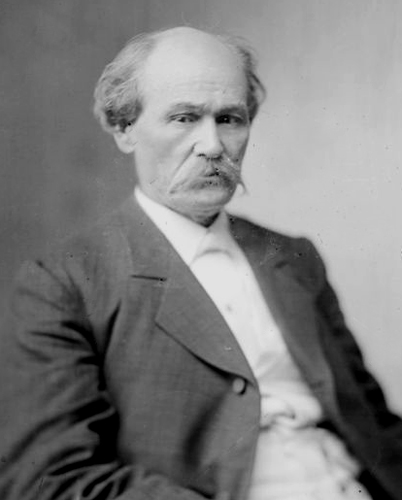Get Today in Masonic History into your Inbox. Sign up today for one of our email lists!
Need an article for your Trestleboard/Newsletter see our Use Policy
Isham Green Harris is Born

Today in Masonic History Isham Green Harris is born in 1818.
Isham Green Harris was an American politician.
Harris was born on February 10th, 1818 in Franklin County, Tennessee. He was educated at Carrick Academy in Winchester, Tennessee until he was fourteen. He then moved to Paris, Tennessee where he joined up with his brother and became a store clerk. In 1838, he moved to Ripley, Mississippi, an area just opened up to settlers after a treaty was signed with the Chickasaw Indians. With funds his brother gave him, Harris established a business in Ripley. After three years he sold the business and moved back to Paris.
After returning to Paris, Harris began reading law under a local judge. In 1841 he was admitted to the bar and established a lucrative legal practice. He became one of the leading criminal attorneys in the state.
In 1847, Harris entered politics when local Democrats convinced him to go up against the Whig candidate for the Tennessee State Senate. By August of 1847, the Whig candidate had dropped out of the race when anti-war comments made by the Congressional Whig candidate damaged all the Whig candidates. A new Whig candidate came forward and Harris easily defeated him. Shortly after getting into the State Senate Harris sponsored a resolution condemning the Wilmot Proviso which banned slavery in any territory the United States gained from the Mexican-American war.
In 1849, Harris was elected to the United States House of Representatives. He spent most of his time attacking the Compromise of 1950, a series of bills dealing with the issue of slavery in the new territories. Neither the free states or the slave states liked items in the bills. Harris won a second term in 1851 and then chose not to run in 1853, after the Whig party took control of the Tennessee Legislature and gerrymandered his district.
In 1856, Harris was chosen as a presidential elector for James Buchanan. This gave Harris statewide recognition due to the requirement for him to campaign for Buchanan. In 1857, Governor Andrew Johnson was injured in a train accident and was unable to continue on with his term. Harris was chosen to replace Johnson as the Democratic candidate and won election later the same year. This became the death knell of the states Know Nothing party who had risen to prominence following the collapse of the Whig party. Harris successfully ran for reelection in 1859 as well.
During the 1860 Presidential campaign, Harris stated the state must consider secession if the "reckless fanatics of the north" gained control of the federal government. Following Lincoln's election, Harris asked the legislature to hold a referendum on whether the state should secede. Secession was voted down by Tennesseans with a vote of 68,000 to 59,000. After the battle of Fort Sumter, Lincoln ordered Tennessee to provide 50,000 soldiers. Harris read his reply to a crowd in Nashville stating "Not a single man will be furnished from Tennessee," and stated he'd rather cut off his right arm than sign the order. A week later Harris was before the Tennessee legislature stating the Union had been destroyed by the "bloody and tyrannical policies of the Presidential usurper," and called for an end to the state's ties to the United States. Shortly after the Legislature authorized Harris to enter into a Compact with the Confederate States of America.
By the end of 1861, the Union Army had invaded Tennessee. Within four months Harris had been driven out of Nashville and was on the move with Confederate forces. He continued to issue order as Governor, although a military Governor had been appointed and an election was held to elect Harris' replacement. Despite this Harris continued to act as the Governor of Tennessee. After the war he was forced to flee to Mexico when a warrant was issued for Harris. In the warrant it stated "His eyes are deep and penetrating—a perfect index to a heart of a traitor—with the scowl and frown of a demon resting upon his brow. His study of mischief and the practice of crime have brought upon him premature baldness and a gray beard." The description was given by the new Governor of Tennessee who hoped to taunt Harris.
With other Confederates, Harris tried to rally the Confederate cause with Emperor Maximilian of Mexico. When Maximilian was removed from power, Harris fled to England in 1867. Later the same year the Governor of Tennessee stated he rescinded the warrant, Harris returned to Tennessee. It is said the Governor met Harris in Nashville on his return and the Governor stated "While the lamp holds out to burn, the vilest sinner may return."
By 1877, the Democrats once again controlled the Tennessee Legislature and Harris was elected to one of the States United States Senate seats. He served in the Senate until his passing on July 8th, 1897.
Harris was a member of Paris Lodge No. 108 in Paris, Tennessee. He was elected to serve as Grand Orator for the Grand Lodge of Tennessee in 1851, but was unable to serve.
This article provided by Brother Eric C. Steele.

